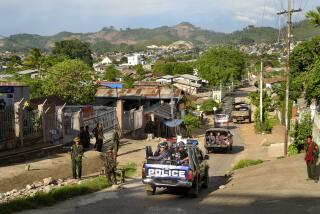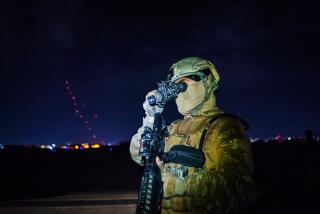Marines Seize More Arms in Mogadishu
- Share via
MOGADISHU, Somalia — For the third day in a row, Marines seized hidden weapons in what U.S. officials say is part of a campaign to tighten up security in this capital city, a strategic political prize for Somalia’s rival clan-based militias.
The object Monday was the biggest arms bazaar in the city. Sunday, Marines raided an ammunition storage compound on the south side of the city. Saturday, they dismantled 26 pieces of artillery belonging to a small clan militia that had been fighting off and on with enemy groups since the New Year.
“We’re looking for a muzzle,” one young U.S. Marine said Monday on his way to the arms section of the Bakara open-air market.
Few shots have been fired during the operations; none were fired Monday.
The Marines were applauded by some residents in surrounding neighborhoods as they approached in a convoy of 80 trucks, jeeps and armored, tracked vehicles.
The biggest problems were the mud from recent rains that made walking treacherous and an initial reluctance of bystanders to point out arms caches. Somalis told Marines that they might face reprisals from the arms owners.
U.S. officials insist that they entertain no plans to generally disarm Somalis. But flare-ups of shooting in Mogadishu seem to have created a resolve to shut down the most visible sources of weapons and firing.
In addition, as Marines are withdrawn from the countryside and bunked in Mogadishu, more troops are available for the weapons sweeps; 900 Marines raided the market and sealed surrounding neighborhoods.
Disarmament in Mogadishu has a special political meaning because of the presence of two major clan militia leaders, Mohammed Farah Aidid and Ali Mahdi Mohamed. Each aspires to rule Somalia, and each thought that control of Mogadishu would seal his victory. If the two are defanged--and U.S. officials say such a program is not planned--it would significantly alter the political balance in the country.
In any event, arms sales at Bakara had come to symbolize the lawlessness in the capital. Bakara is the city’s largest market. Clothes, fruit and vegetables--along with guns--were for sale even during the height of the two-year civil war.
The market was also a place where Somalis with savings or those who had received money from relatives abroad could count on depositing meager savings. Merchants banded together to form a security force across clan lines, which made the site out of bounds for looters.
This arrangement may have been threatened by the Marine action. One Somali handed a letter in English to a Marine that read: “If you’re American, you have no right to take the guns, when the enemy is in the market. Thanks for nothing.”
Marine spokesmen declined to estimate the number of weapons that were seized.
More to Read
Sign up for Essential California
The most important California stories and recommendations in your inbox every morning.
You may occasionally receive promotional content from the Los Angeles Times.













